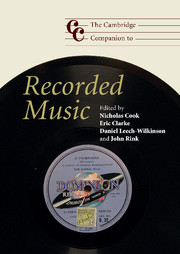Book contents
- Frontmatter
- Introduction
- Learning to live with recording
- A short take in praise of long takes
- 1 Performing for (and against) the microphone
- Producing a credible vocal
- ‘It could have happened’: The evolution of music construction
- 2 Recording practices and the role of the producer
- Still small voices
- Broadening horizons: ‘Performance’ in the studio
- 3 Getting sounds: The art of sound engineering
- Limitations and creativity in recording and performance
- Records and recordings in post-punk England, 1978–80
- 4 The politics of the recording studio: A case study from South Africa
- From Lanza to Lassus
- 5 From wind-up to iPod: Techno-cultures of listening
- A matter of circumstance: On experiencing recordings
- 6 Selling sounds: Recordings and the record business
- Revisiting concert life in the mid-century: The survival of acetate discs
- 7 The development of recording technologies
- Raiders of the lost archive
- The original cast recording of West Side Story
- 8 The recorded document: Interpretation and discography
- One man's approach to remastering
- Technology, the studio, music
- Reminder: A recording is not a performance
- 9 Methods for analysing recordings
- 10 Recordings and histories of performance style
- Recreating history: A clarinettist's retrospective
- 11 Going critical: Writing about recordings
- Something in the air
- Afterword: Recording: From reproduction to representation to remediation
- Notes
- Bibliography
- Discography
- Index
11 - Going critical: Writing about recordings
Published online by Cambridge University Press: 28 September 2011
- Frontmatter
- Introduction
- Learning to live with recording
- A short take in praise of long takes
- 1 Performing for (and against) the microphone
- Producing a credible vocal
- ‘It could have happened’: The evolution of music construction
- 2 Recording practices and the role of the producer
- Still small voices
- Broadening horizons: ‘Performance’ in the studio
- 3 Getting sounds: The art of sound engineering
- Limitations and creativity in recording and performance
- Records and recordings in post-punk England, 1978–80
- 4 The politics of the recording studio: A case study from South Africa
- From Lanza to Lassus
- 5 From wind-up to iPod: Techno-cultures of listening
- A matter of circumstance: On experiencing recordings
- 6 Selling sounds: Recordings and the record business
- Revisiting concert life in the mid-century: The survival of acetate discs
- 7 The development of recording technologies
- Raiders of the lost archive
- The original cast recording of West Side Story
- 8 The recorded document: Interpretation and discography
- One man's approach to remastering
- Technology, the studio, music
- Reminder: A recording is not a performance
- 9 Methods for analysing recordings
- 10 Recordings and histories of performance style
- Recreating history: A clarinettist's retrospective
- 11 Going critical: Writing about recordings
- Something in the air
- Afterword: Recording: From reproduction to representation to remediation
- Notes
- Bibliography
- Discography
- Index
Summary
Introduction: Criticism and commerce
The talking machine, as is well-known, found its first sponsor in the cycle trade – the music trade would have none of it.
Phono Trader and Recorder, 1911
For about twenty years, between 1972 and 1992, I practised as a rock critic. While this did mean reviewing concerts and sometimes talking to performers, to be a rock critic was to be a record critic. My first published work was a record review in Rolling Stone, and rock, as a new kind of musical institution, was centred on the record. The founding fathers of rock criticism, Greil Marcus and Jon Landau, both edited Rolling Stone's record review pages, while Robert Christgau, the self-titled Dean of Rock Criticism, started his Consumer Guide, capsule reviews of every rock record released, in 1969.
Towards the end of my time as a critic I began to notice articles about the decline of rock criticism. ‘Where have all the rock critics gone?’ asked Ed Ward, editor of the Rolling Stone history of rock ‘n’ roll, in August 1988, following up his question later that year with the more assertive ‘Rock Critics RIP!’ This was to become a recurring feature-story line. In 1998 Gina Arnold, a leading voice in the next generation of American rock critics, reflected in her turn ‘On the death of rock criticism’ (‘Once it was about passion. Now it's all puff’) in the online Flagpole Magazine, while veteran Italian rock critic, Gino Castaldo, deplored the ‘strong decrease in the demand for critics’.
- Type
- Chapter
- Information
- The Cambridge Companion to Recorded Music , pp. 267 - 282Publisher: Cambridge University PressPrint publication year: 2009
- 1
- Cited by

